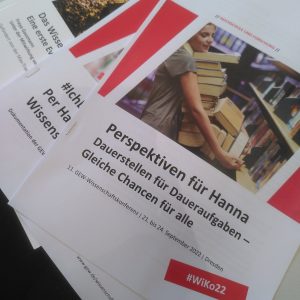The Federal Ministry of Education and Research (BMBF) invited representatives from the science system to the conference “Good Working Conditions in Science – Towards a Reform of the WissZeitVG” on June 27, 2022. RespectScience e.V. signed a statement on the amendment of the WissZeitVG together with many other supporters. The BMBF must finally act and a reform is inevitable!
A plea to reform fixed-term contract law
Scientific research in Germany is amidst a crisis – and is entirely unaware of the fact. It is a crisis of wasted potential, the cost of which is born by those without whom the system would collapse: academics without a professorship. Insecurity and anxiety about the future, stress and conditions of dramatic dependency define the professional working life of academics. Although, by now most research and education is shouldered by academics without a professorship, reliable working conditions and stable perspectives are usually only provided for professors.
How productive could our science be if the potential of our academics were put to full use?
Ultimately, science consists of thinking, experimenting and critical questioning. But this takes time – and doing so under time pressure and with worries about the future leads to diminishing quality and self-exploitation. The unique quirks of an academic career do not affect everyone equally. Power structures leaning on factors like race, class, gender and ability have a decisive influence on access, career paths and career opportunities in academia.
Today, the employment of graduates working towards a doctorate and of postdoctoral research fellows is primarily governed by the Act on Fixed-term Contracts in Academia (WissZeitVG). This act was amended in 2016, and the influence of this amendment on the employment situation was examined in several studies published last month. The results are sobering: There has been no change leading to more permanent employment contracts, and the number of short-term contracts with a term of one year or less has not been significantly reduced. Qualification periods are not in the least covered by the length of contract terms. The instruments of academic affirmative action do not have a reliable effect. The organisations whose signature is affixed below are therefore convinced of the urgent necessity of a bold and essential reform of the special laws governing fixed-term contracts in academia.
Cornerstones for better planning and equal career opportunities in academia:
1. The term qualification must have a strict and legally binding definition in WissZeitVG.
2. Employment in the course of achieving a doctorate can justify a fixed-term contract. We, therefore, do not see any justification for other qualification goals being viewed as a reason for fixed-term employment at this time.
3. As a rule, entry into the postdoc phase should be associated with a permanent employment contract or at least a predictable process for converting fixed-term academic contracts into permanent ones. Employees whose work is characterised by permanent tasks must receive permanent contracts.
4. The term of a contract must correspond to the expected duration of the qualification objective. As the evaluations prove beyond doubt, this is not the case: Average contract terms across the board is roughly 20 months for graduates working on a doctorate, compared to the average time of 4.7 years needed to achieve a doctorate (see Bundesbericht Wissenschaftlicher Nachwuchs 2021, federal report on the next generation of academics 2021). This shows that the 2016 amendment to the Act on Fixed-term Contracts in Academia has failed by its own standards. The average qualification periods should therefore be separately evaluated for each field to establish binding requirements on this basis. Non-binding legal phrasing is apparently not sufficient.
5. As the evaluation shows, extending the maximum possible fixed term of a contract (Section 2 (1) Sentences 4-6 WissZeitVG) has until now not led to any significant extension of existing contracts. Therefore, this needs to be reformulated as a legal right of employees. Rights to the extension of the contract should be accessible for all employees that are employed with the goal of reaching a qualification.
6. The ban on collective agreements must be abolished. Fixed-term contracts in academia are the only area in which employment law prohibits social partners from regulating essential questions regarding working conditions through a collective agreement. This presents a striking contradiction to the declared goal of the German Federal Government, expressed in the coalition agreement, to strengthen collective bargaining autonomy.
bukof – Bundeskonferenz der Frauen- und Gleichstellungsbeauftragten an Hochschulen (Federal Conference of Women’s Representatives and Equal Opportunities Representatives at Universities)
DGB – Deutscher Gewerkschaftsbund (German Confederation of Trade Unions)
GEW – Gewerkschaft Erziehung und Wissenschaft (Education and Science Workers’ Union)
Helmholtz Juniors – Netzwerk der Promovierenden der Helmholtz Gemeinschaft (Network of doctoral students of the Helmholtz Association)
Leibniz PhD Network – Netzwerk der Promovierenden der Leibniz Gemeinschaft (Network of doctoral students of the Leibniz Association)
NGA Wiss – Netzwerk für Gute Arbeit in der Wissenschaft (Network for Good Work in Academia)
ver.di – Vereinte Dienstleistungsgewerkschaft (United Services Trade Union)
respect science – Verein für neue Anreize in der Wissenschaft (Society for New Incentives in Science)




